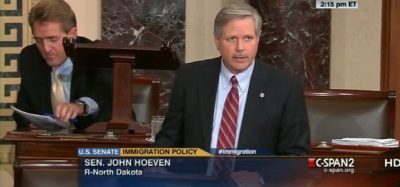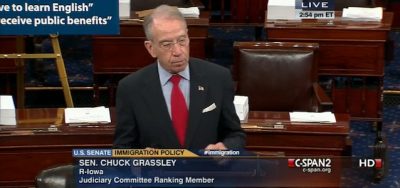Border Enforcement
Migration at the border is a multifaceted issue, challenging the U.S. to secure our borders while upholding the human rights of individuals seeking safety and better opportunities. Balancing national security with compassion and our legal obligations to asylum seekers presents intricate dilemmas, and we collaborate with policymakers to advance bipartisan, action-oriented solutions.
Beyond A Border Solution
- Asylum
- May 3, 2023
America needs durable solutions. These concrete measures can bring orderliness to our border and modernize our overwhelmed asylum system. Read…
Read More
An Unlikely Couple: The Similar Approaches to Border Enforcement in H.R. 1417 and S. 744
The House of Representatives and the Senate have embarked upon very different paths when it comes to immigration reform. On June 27, the Senate passed a comprehensive immigration reform bill—S. 744 (the Border Security, Economic Opportunity, and Immigration Modernization Act)—that seeks to revamp practically every dysfunctional component of the U.S. immigration system. The House leadership, on the other hand, favors a piecemeal approach in which a series of immigration bills are passed, each addressing a different aspect of the larger immigration system. To date, the most popular of these piecemeal bills has been H.R. 1417 (the Border Security Results Act), which was passed unanimously on May 15 by the House Committee on Homeland Security. H.R. 1417 is, in marked contrast to S. 744, an enforcement-only bill which does not acknowledge the existence of any other component of immigration reform. Nevertheless, the border-enforcement provisions of S. 744 aren’t all that different from those contained within H.R. 1417. Both bills share the arbitrary and possibly unworkable goals of “operational control” (a 90 percent deterrence rate) and 100 percent “situational awareness” along the entire southwest border. The Senate bill also added insult to injury in the form of the Corker-Hoeven (“border surge”) amendment, which seeks to micromanage border-security operations and would gratuitously appropriate tens of billions of dollars in additional funding, and hire tens of thousands of additional Border Patrol agents, before the Department of Homeland Security (DHS) has even determined what resource and staffing levels are needed to do the job. Read More

Immigration Reform an Imperative for Cities and Metropolitan Areas
Metropolitan leaders from around the country made the case for immigration reform at an event hosted by the Brookings Institution’s Metropolitan Policy Program today. Over 80 percent of the U.S. population, including 95 percent of immigrants, now live in metropolitan areas; cities and towns across the country therefore have a huge stake in passing immigration reform. In fact, panelists agreed that comprehensive immigration reform is an imperative for metropolitan areas. “We need an immigration system that is keeping with the times,” stated Audrey Singer, a Senior Fellow with Brookings. Read More

New Estimates of State and Local Taxes Paid by Undocumented Immigrants
Undocumented immigrants who live and work in the United States pay billions of dollars in taxes every year to state and local governments. Given the chance to earn legal status, they would pay even more. Those are the simple yet powerful conclusions of a new study by the Institute on Taxation and Economic Policy (ITEP). According to ITEP, “undocumented immigrants paid an estimated total of $10.6 billion in state and local taxes in 2010.” Moreover, “allowing undocumented immigrants to work in the United States legally would increase their state and local tax contributions by an estimated $2 billion a year.” In short, legalization pays. Read More

DREAMers Push For A Path To Citizenship
Ahead of a Wednesday meeting of House Republicans to discuss various options on immigration reform, hundreds of DREAMers—young immigrants who arrived in the U.S. as children—held their own version of a citizenship ceremony and rally yesterday to push for legislation that will provide a roadmap to citizenship for not only themselves but for millions of other undocumented immigrants as well. “We have come today to claim our citizenship,” said United We Dream’s Lorella Praeli. “2013 is not the time for separate but equal. It is not the time for legalization for some and citizenship for others.” Read More

TRUST Act Makes Progress in California
Just before the Fourth of July, the California Senate Public Safety Committee approved the TRUST Act by a vote of 4-2.. The state Assembly previously passed the measure in May, so now the bill heads to the Senate floor. It is the third version of the California TRUST Act considered by the state legislature, which “would limit who state and local police can hold for deportation.” Gov. Jerry Brown (D) vetoed a previous version of the bill last fall. Read More

Immigrants Boost Economic Vitality through the Housing Market
Abundant research shows that immigration is a net benefit to the United States’ economy. It leads to higher wages, business formation, job creation, and greater innovation – nationally and locally. Foreign workers who immigrate to the U.S. help alleviate labor force gaps left by a workforce increasingly nearing and entering retirement age. Furthermore, immigrants help fulfill growing healthcare needs of an aging population. In addition to these positive benefits of immigration, the favorable effect immigrant home-buyers have on the housing market is another important economic impact. Indeed, new research from the Americas Society/Council of the Americas and the Partnership for a New American Economy describes how the 40 million immigrants residing in the United States added $3.7 trillion to housing wealth in the U.S. The research, prepared by Jacob Vigdor at Duke University, uses county-level data on population and housing from the U.S. Census Bureau and American Community Survey from 1970 to 2010. The results show that immigration led to a boost in home values, particularly in neighborhoods hit hardest by the U.S. housing bust. Read More

Beyond the Border Surge, What Else Is In the Senate Compromise?
On Monday, the Senate voted 67 to 27 to invoke cloture on Leahy 1183, an amendment to substitute the current version of the Senate’s immigration reform bill, S. 744, with a revised version of the bill that includes a host of amendments that have been referred to as the Corker/Hoeven compromise—or, more simply, the border surge. Thirty hours from that vote—sometime Wednesday morning—the Senate will actually vote on whether to adopt Leahy 1183. The cloture vote is a strong indicator of passage of the amendment and, many predict, of the bill overall. Read More

Is a Border Surge the Only Way to Pass Immigration Reform and Ensure Legalization?
During the second full week of debate on S. 744, momentum towards passage increased with a positive CBO score, the defeat of several poison-pill amendments, and the announcement of a Republican border amendment that is thought to bring ten to fifteen Republicans to “yes” on final passage. A series of critical cloture votes is likely to be filed over the next few days, paving the way for a final vote next Friday. Despite this news, the mood is not jubilant, as good policy seems to be losing to pragmatic politics. Read More

House Immigration Bill Promotes Old Model Immigration Solutions
Today the House held a hearing on H.R. 2278, the "Strengthen and Fortify Enforcement Act" (the SAFE Act), which is designed, as its name suggests, to be a lopsided, enforcement-only bill that imposes additional criminal penalties, border security, and detention and deportation, while encouraging discredited policies such as self-deportation and state interference with immigration law. Instead of these old enforcement-only policies, which do not work, what is needed is a comprehensive solution that fixes our broken legal immigration system and provides a path to earned legalization. Read More

Border Security Amendments To Delay Legalization Harm Immigration Bill Efforts
During The first full day of debate after the Senate approved a motion to proceed to S. 744, the Border Security, Economic Opportunity, and Immigration Modernization Act, several Senators sought to make the debate all about border security. In the process, they proposed amendments that tie border security increases to the start of the legalization program in ways that make legalization a virtually unattainable goal. One of these amendments is from Sen. John Cornyn (R-TX). His RESULTS amendment ties the fate of unauthorized immigrants who are already living in the United States, and who have applied for legalization, to the success of highly stringent border-enforcement measures in deterring future unauthorized immigration. However, applicants for legalization have no control over the ability of the federal government to maintain the integrity of U.S. borders, so there is no logical reason to link their legal status to border-enforcement metrics. The RESULTS amendment also mistakenly views immigration reform as a two-step process: enforcement, followed by legalization. However, the various components of immigration reform must be implemented simultaneously to maximize their effectiveness. The amendment breaks apart what should by a single, integrated revamping of U.S. immigration policy. Finally, the RESULTS amendment contains no mechanism for judging the feasibility or cost-effectiveness of the border-security measures and metrics that it would mandate. Read More
Make a contribution
Make a direct impact on the lives of immigrants.

